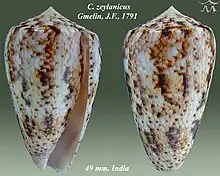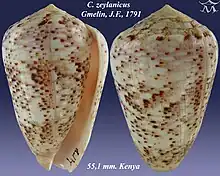| Conus zeylanicus | |
|---|---|
 | |
| Apertural and abapertural views of shell of Conus zeylanicus Gmelin, J.F., 1791 | |
 | |
| Scientific classification | |
| Domain: | Eukaryota |
| Kingdom: | Animalia |
| Phylum: | Mollusca |
| Class: | Gastropoda |
| Subclass: | Caenogastropoda |
| Order: | Neogastropoda |
| Superfamily: | Conoidea |
| Family: | Conidae |
| Genus: | Conus |
| Species: | C. zeylanicus |
| Binomial name | |
| Conus zeylanicus Petuch, 1987 | |
| Synonyms[1] | |
| |
Conus zeylanicus, common name the obese cone, is a species of sea snail, a marine gastropod mollusk in the family Conidae, the cone snails and their allies.[1]
These snails are predatory and venomous. They are capable of "stinging" humans, therefore live ones should be handled carefully or not at all.
Description
The size of the shell varies between 27 mm and 78 mm. The shell is obsoletely coronated with tubercles. The stout body whorl is somewhat convex. The ground color of the shell is white or very pale yellow or bluish, faintly clouded, with numerous small chestnut or chocolate spots and short lines, often forming dark clouds, so placed as to make interrupted, revolving bands.[2]
Distribution
This marine species occurs in the Indian Ocean (Tanzania, Mascarene Islands) and eastwards as far as Indonesia.
References
- Drivas, J.; Jay, M. (1987). Coquillages de La Réunion et de l'Île Maurice. Collection Les Beautés de la Nature. Delachaux et Niestlé: Neuchâtel. ISBN 2-603-00654-1. 159 pp
- Puillandre, N.; Duda, T.F.; Meyer, C.; Olivera, B.M.; Bouchet, P. (2015). "One, four or 100 genera? A new classification of the cone snails". Journal of Molluscan Studies. 81 (1): 1–23. doi:10.1093/mollus/eyu055. PMC 4541476. PMID 26300576.
External links
 Conus zeylanicus Gmelin, J.F., 1791
Conus zeylanicus Gmelin, J.F., 1791